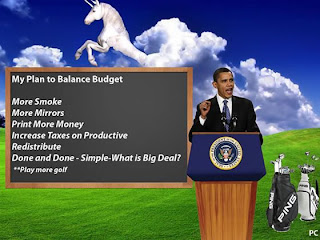Right now, Democrats believe they have the upper hand in the fiscal standoff. Patty Murray (Wash.) — the fourth-ranking Senate Democrat and the leading champion on Capitol Hill for going over the fiscal cliff — says that Republicans are "in a real box" because "if they do nothing, those increased taxes [they oppose] will take place." If Republicans dig in, says Murray, all Democrats need to do is "go past the December 31st deadline" and let the tax increases happen automatically.
There's one problem with her scenario: While the Bush tax cuts expire on Dec. 31, so do a lot of tax policies the Democrats support. For example:
●The 10 percent income tax bracket would disappear, so the lowest tax rate would be 15 percent.
●The employee share of the Social Security payroll tax would rise from 4.2 percent to 6.2 percent.
●An estimated 33 million taxpayers — many in high-tax blue states — would be required to pay the alternative minimum tax, up from 4 million who owed it in 2011.
●The child tax credit would be cut in half, from $1,000 today to $500, and would no longer be refundable for most.
●Tax preferences for alternative fuels, community development and other Democratic priorities would go away.
●And the expansions of the earned income tax credit and the dependent care credit would disappear as well.
Letting these tax policies expire would level the playing field for Republicans in tax negotiations next year. Instead of being in a "box," Republican leaders would have leverage again — something the Democrats want and would have to make concessions to get.
Going over the fiscal cliff would help the GOP in another way: It would save Republicans from having to break their pledge not to raise taxes. If GOP leaders hold the line on taxes this fall, and the Bush tax cuts expire despite their best efforts, it would not harm their reputation as the party of low taxes. But if Republicans vote proactively to raise taxes as part of a "grand bargain," the GOP brand would be irreparably damaged. Raising taxes and losing a fight to stop automatic tax increases are two different things.
Moreover, if the Bush tax cuts expire, the baseline for future negotiations would be reset. A bipartisan agreement would be within reach that reforms and simplifies the tax code, with a top rate lower than the Clinton rate but higher than the Bush one. Instead of Republicans being under pressure to raise taxes, Obama and the Democrats would be under pressure to reduce the top rate from the Clinton level as part of an eventual deal.
For the GOP, this would be far preferable to the current scenario. Right now, Democrats are demanding that Republicans raise taxes while Republicans are demanding that Democrats agree to cut Social Security and Medicare spending. A grand bargain this fall, then, would mean that Republicans get to raise revenue from their own supporters (small-business job creators) in exchange for cutting spending for their own supporters (seniors). Genius! Much better to wipe the slate clean, and start over with more leverage for fundamental tax reform and structural entitlement reform.
What if we go off the fiscal cliff and Democrats still won't negotiate? Then Republicans should make clear that they are willing to live with the higher, Clinton-era rates. It will be hard for the Democrats to paint such a scenario as an economic disaster, because letting the Bush tax cuts expire simply restores the status quo during the Clinton administration. During the campaign, President Obama repeatedly told us how he wants to "go back to the income tax rates we were paying under Bill Clinton — back when our economy created nearly 23 million new jobs, the biggest budget surplus in history, and plenty of millionaires to boot." Well if the Clinton tax rates were so great, let's go back to all of the Clinton rates and relive the booming '90s.
At least going back to the Clinton rates would put more people on the tax rolls, and give more Americans a stake in constraining government spending. It would also force all Americans — including the middle class — to pay for growing government services, instead of borrowing the money from China and passing the costs on to the next generation.
Americans had a choice this November, and they voted for bigger government. Rather shielding voters from the consequences of their decisions, let them pay for it.
Marc A. Thiessen, a fellow with the American Enterprise Institute, writes a weekly online column for The Post.
 The federal government has just decided that poverty for family of 4 in New York City means an income of up to $37,500, not $22,500. Quite a leap. As before the figure excludes earned income tax credit cash checks from the government and also medical and other non-cash assistance.
The federal government has just decided that poverty for family of 4 in New York City means an income of up to $37,500, not $22,500. Quite a leap. As before the figure excludes earned income tax credit cash checks from the government and also medical and other non-cash assistance.




896
Comments